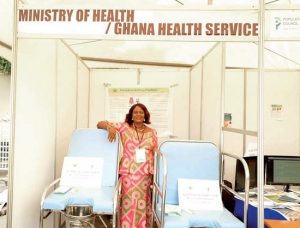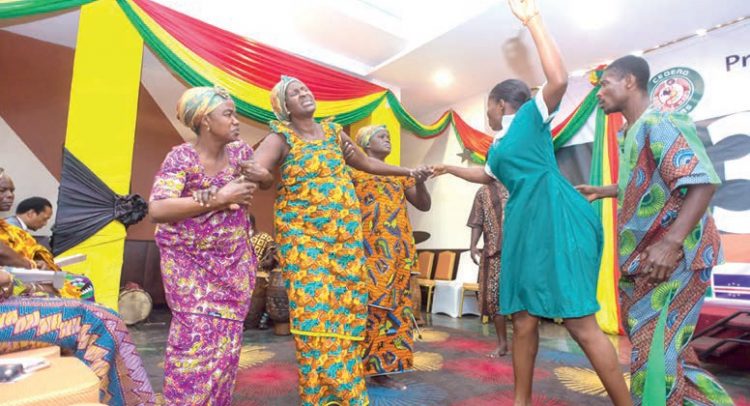A display of drama depicting health challenges in ECOWAS
Cecilia Ama Ampadu stands under the Ministry of Health/Ghana Health Service exhibition stand at the 3rd Economic Community of West Africa States (ECOWAS) Forum on Best Practice in Health.
She is among other exhibitors from across the sub-region who have come to showcase their problem-solving innovations that address challenges encountered in the sub-region in terms of healthcare delivery.
Ms. Ampadu, a senior midwifery officer at the Ministry of Health and the Ghana Health Service, is the inventor of the alternative birthing positions — sitting delivery chair and the squatting delivery chair— to be used in health facilities.
The chairs provide labouring mothers the option of either sitting or squatting to deliver of their babies as an alternative of the stirrup position— the patient is laid on the back with knees bent, positioned above the hips, and spread apart through the use of stirrups—which seem preferable to the attending medical staff because it enables him or her to have easy access to the delivery.
Ms. Ampadu says the stirrup position to some labouring mothers-to-be provides discomfort and excessive stress since “she is made to push her baby all by herself without the helpful force of gravity that characterizes delivery by either kneeling, sitting or squatting.”
Justifying the need for alternative birthing positions, she says evidence has shown that about 44 per cent of deliveries are done at home by traditional birth attendance (TBAs) in Ghana although the child delivery policy of Ghana prescribes that all mothers should deliver in health facilities where skilled deliveries can be assured.
“The main reason is that women have the option of choosing a preferred birthing position when they deliver in the homes unlike the health facility where they are made to lie on their back with their leg in stirrup position.
This is the main reason why Kumbungu community and others in the northern parts of Ghana practise these alternative birthing methods,” she adds.
The senior midwife explains that sitting and squatting positions make delivery easier and faster and also prevent many complications to the mother and the baby as compared to the stirrup position.
The invention has since been adopted in some health facilities in the country, including four in the Greater Accra Region, since 2015.
The success story of Ms. Ampadu’s alternative birthing chairs is just one of the numerous successes that have emerged from the ECOWAS Best Practices Forum in Health.
Hosted by the West African Health Organisation (WAHO), this year’s the ECOWAS Best Practices Forum focused on highlighting home-grown solutions to maternal, neonatal, child, adolescent and reproductive health challenges in the sub-region.

Cecilia Ama Ampadu standing by her invention
ECOWAS Best Practices Forum
Member countries are making sufficient efforts towards improved health services performance, particularly through high impact interventions that have proven effective and efficient.
This performance can be assessed at both leadership and management and technical and clinical levels.
To achieve the desired performance level, all health system’s components are to be at play in the search for best practices that should be identified, documented, shared and scaled up at the national level.
These components include mainly the governance system, health service delivery, human resources for health, health financing, health information systems, health technologies, community participation and partnership and health research.
Some of the country practices in this area may be considered as ‘best practices’ and others as ‘promising practices’. A practice in public health is considered a ‘best practice’ or ‘promising practice’ on the basis of evaluation criteria, which are
evidence of success and potential for replication.
For a practice to be considered as a ‘best practice’, evidence must be provided that the said practice has had a positive impact and/or has helped to achieve programme objectives.
It is then showcased at the ECOWAS Forum on Best Practice, where countries can learn and share experiences with one another to improve healthcare delivery, particularly to the vulnerable in the sub-region.
The Director General of WAHO, Prof. Stanley Okolo, sheds more light on the Forum on Best Practices in the following interview with DAILY GUIDE.
Daily Guide: What is the essence of this forum?
Prof Okolo: One of the things that has been proved is that often interventions that are borrowed are not always as effective as interventions that are indigenous to the population because ownership and community involvement is very key.
There are so many things that we know that internationally, under evidence based that it is effective and we are encouraging its practices.
But, in addition, we are encouraging people to come together to showcase some of the things that they have been doing themselves in their local areas.
So when we do this, we are not asking for governments alone to showcase their best practices even though we advertise through governments, groups working independently of government, universities, inventors are all called upon to present their inventions of best practices on the area of focus.
Daily Guide: What happens to the best practices showcased at the forum?
Prof Okolo: When we finish this meeting, it is not the end of it. We then encourage countries to set up best practices committees in each country.
After showing evidence of proof of concept then we will go to the countries to have the best practices technical committees to support them and nurture them following, which then it is scaled up.
The true test is how much some of the things are done here that we do not just leave here but we see how we expand them.
Over the past three years, we have had seven out of 15 countries through the process of our best practices forum set up best practice committees, which we then send professionals to go and support them to make sure that the committees deliver.
For example, the lady who invented the birthstool, when she presented it to WAHO, we spoke to the Ghanaian government to actually mass produce through the best practice committee support.
What we have to do going forward is to try and advocate ministries to adopt it so that it becomes integral to the national health planning and we will know how we can improve whatever has been proven.
Daily Guide: What is the level of cooperation among member states in terms of harmonizing healthcare?
Prof. Okolo: The momentum is high and it is not the people around the room alone, the driving force is how do we impact the population and we can only work through our partnerships, stakeholders and the people in the country.
WAHO alone cannot do it, so the main thing in trying to constantly renew our efforts in WAHO and projects and constantly keeping an eye on the price which is to impact the population.
We must continue to work with each and everybody that can advance the ideals of WAHO, which is to improve our indices— SDG, mortality rate, malaria.
Daily Guide: What are the other areas of focus for WAHO?
Prof Okolo: We have conceptualized the programme where we think WAHO can have an impact because WAHO is a cross cutting inter regional organization with five themes; maternal neonatal, adolescent and child health, pharmaceuticals in terms of access and quality of drugs, epidemics and non-communicable diseases, health tourism and health tourism.
We are looking at getting some centres of excellence for medical tourism because about $1. 2 billion is what we think that people spend on medical tourism outside and we have the facilities if we organize together and build it and the
But more importantly, we cannot achieve anything without accurate and relevant health information so at the moment we are getting data that give us the tools to first of all know what is going on and then from knowing what is going on we can then advocate with the ministries and heads of government the directions in which to go.
But data in terms of being aware early enough if we are going to have an epidemic at the moment, we cannot predict any epidemic but what we can do is to prepare for them to make sure that we have surveillance and gathering the information that we detect it early and then to respond so that it does not become and epidemic.
Daily Guide: How does WAHO keep the momentum?
Prof Okolo: We keep up the energy by constantly renewing. We keep up the energy through the media because I want the people to own this programme. I want it to be the population that will be asking questions in terms of fake drugs, I want it to be the population that will be asking question in terms of when they go to the hospital and they see that it becomes normal for somebody to die.
I want it to be the people that own it, so we will go through social media and all forms of media to sensitize the people. We cannot do it alone; we will bring the tools. We will challenge you, but the media has a lot to help us with.
By Jamila Akweley Okertchiri


